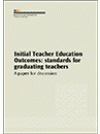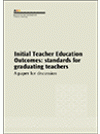This paper and its companion, Learning to Practise (2013), are designed to inform policy and promote discussion on programme development for initial teacher education and the mentoring of beginning teachers. The papers are among a number of initiatives to improve the quality of teaching in ways that raise outcomes for learners, particularly those not deriving fair benefit from the current system.
This paper proposes expectations for teacher candidates at the point of graduation and entry into the profession: what they should be able to do, and the knowledge, competencies, dispositions, ethical principles, and commitment to social justice that they should possess. We refer to these expectations as ‘standards’ but we use the term synonymously with ‘graduate profile’, acknowledging that institutions, particularly universities, may describe profiles that encompass more general characteristics consistent with their obligations under the Education Act.
We begin by outlining the challenges involved in writing standards for initial teacher education. We then examine the current international and New Zealand contexts with the aim of understanding how best to design standards that will support quality teaching. This leads us to propose an inquiry-oriented model for graduate teaching – the Teaching for Better Learning model – together with related standards.
The standards we propose are structured around a series of inquiries designed to establish learning priorities and teaching strategies, examine the enactment of strategies and their impact, determine professional learning priorities, and critique the education system. In making these inquiries, teacher candidates draw on as resources education’s body of knowledge, competencies, dispositions, ethical principles, and their own commitment to social justice. The standards emphasise the context-dependent nature of effective teaching and, therefore, adaptive expertise as the hallmark of a professional teacher. We conclude by raising some implications of inquiry-oriented standards for a graduate profile and teacher education curricula.
In its vision for the teaching profession, the Education Workforce Advisory Group Report outlines four key system characteristics. Our proposed standards most strongly connect with the first and third of these characteristics: “clear and high professional standards at entry and induction to the profession so that high quality, capable people enter the profession” and “[a system that has at its heart] ongoing professional learning and development” (New Zealand Government, 2010, p. 5).
The standards proposed in this paper are designed not only to define the qualities and capabilities of graduates entering the profession, but also the competencies required by teachers to continue learning, developing and improving the effectiveness of their teaching.
The companion paper identifies and discusses the kinds of teacher education experiences that will support teacher candidates to meet the proposed standards.
Purpose
This paper is a background paper designed to inform discussion and the formulation of policy. It:
- seeks to identify limitations in current approaches to graduating teacher standards
- proposes a model, Teaching for Better Learning, as a basis for standards that address those limitations
- proposes a set of standards from which a graduate profile can be developed.
It is not a policy paper; nor is it a literature review, though it is informed by the literature on standards, effective teaching, inquiry, and teacher education.


